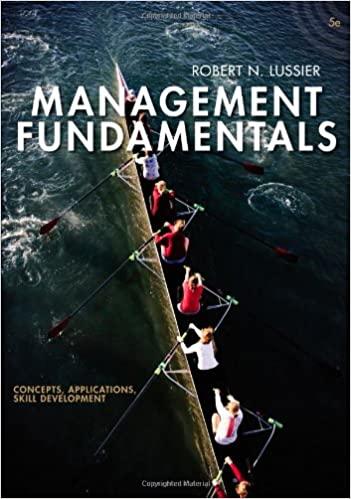Question
Question 1: Managers sometimes fall to identify the problem correctly at the start of the decision-making process. a. True. b. False Question 2: Which of
Question 1: Managers sometimes fall to identify the problem correctly at the start of the decision-making process.
a. True.
b. False
Question 2: Which of the following describe the concept of availability bias?
a. when a person's judgments are based on what is hard to remember
b. When a person is only able to remember something that happens a lot
c. when information that is easy to recall is more likely to be forgotten
d. When a person's judgments are based upon what most readily comes into their mind
Question 3 Your big year-end review is coming up. your company does reviews once a year. your pay depends on this review. You have a good relationship with your manager. All of the following are actions that you should take if you are concerned about the recency effect except ________.
a. Keep a daily journal of accomplishments throughout the year
b. ask for and conduct an informal, mid-year review
c. rely solely on your manager's perception of your performance
d. highlight important achievements, particularly if they are completed close to the performance review date
Question 4: You are craving ice cream which was sold out. which of the following actions is most likely an example of satisfying?
a. ordering cherry vanilla because you think it's close enough
b. ordering mocha almond with sprinkles in order to be adventurous
c. not ordering at all because your favorite ice cream is out of stock
d. going to the next ice cream shop in order to get the flavor that you want
Question 5: _________ is a component of intuition.
a. Fragmented associations
b. slow decisions
c. conscious process
d. Affectively charged judgments
Question 6: Which of the following three fundamental ethical philosophies guide ethical decisions in organizations?
a. Utilitarianism, individual rights, justice, and ethics of care
b. Utilitarianism, enlightenment, justice, and ethical empathy
c. ethics of justice, freedom, relational ethics, and enlightenment
d. optimal ethics, individual rights, and ethics of care
Question 7: Which of the following is a definition of employability?
a. A needs-based assessment focusing on the need that a company must fill in order to be successful.
b. An Attribution employers make about the probability that job candidates will make positive contributions to their organizations
c. A set of behaviors that people use to protect their self-image or change the way they see others.
d. An evaluation of historical performance that seeks to forecast future success.
Question 8: You're preparing for your annual performance review. Your manager walks into the office and makes the following statement. Which of the the following statements would most likely not lead to halo error?
a. "Why don't you write up your own performance evaluation and i'll sign it"
b. "We're just too busy to conduct your performance review so we'll forego it this year, if you're all right with it."
c. "Let's just go with the performance ratings you got last year. you've done pretty much the same thing anyway."
d. "Because we only crave out time for performance reviews once a year, we should start from the beginning of the year and carefully go over things until the end"
Question 9: Perceptual biases have nothing to do with unethical decisions.
a. False
b. True
Question 10: A survey asked a sample of working women to estimate the amount of time they were in a bad mood on the previous day. One result was ________.
a. income actually has less effect on a person's moments of pleasurable experience than on response to questions about their overall well-being
b. material goods strongly related to a person's well-being
c. people who make more money are happier and less stressed than people who make less
d. the higher people's income, the more time they are able to spend with their family.
Step by Step Solution
There are 3 Steps involved in it
Step: 1

Get Instant Access to Expert-Tailored Solutions
See step-by-step solutions with expert insights and AI powered tools for academic success
Step: 2

Step: 3

Ace Your Homework with AI
Get the answers you need in no time with our AI-driven, step-by-step assistance
Get Started


